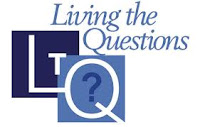"Its influence has been recognized for centuries. It has been quoted and misquoted, used and abused, appealed to and discredited. While American Presidents quote 'a house divided against itself cannot stand' and 'from those to whom much is given, much is required,' Biblical texts have also been used to oppress women, support slavery, justify wars, and today, bolster White Supremacy and other discriminatory movements.
"Preachers try to bring the text alive, classes and small groups provide vital places of discovery. Personal study allows the Bible to speak to an individual’s situation. But what is it exactly that we’re looking for? The Bible is so big, so intimidating, it’s difficult to know where to start. It’s hard to know what to believe or what not to believe…"
The Book “by” Jesus?
"Before leaving for seminary, a young theological student was taken aside by an evangelical pastor and was told in the hushed tone reserved for the imparting of great wisdom, 'You’re going to read a lot of books ABOUT Jesus – don’t forget to read the book BY Jesus!'
"And therein lies what is perhaps the greatest divide among Christians: the authority one places in the text of the Bible. It’s important because how you understand the Christian life depends on how you read the Bible.
How much “authority” do you give scripture? How do you determine the level of trust you place in any written material, for that matter? As perhaps the best-selling, least read book of all time, the Bible needs to be re-examined by most of us. It is not something to be "believed" in, as though it has some magical powers, but to be in relationship with, as one would be with any person or cause or issue to which we give allegiance in this life.
"In his bestseller, Meeting Jesus Again for the First Time, Marcus Borg writes, 'the Christian life is not primarily about believing the right things or even being good. The Christian life is about being in relationship with God which transforms us into more and more compassionate beings, "into the likeness of Christ."' Likewise, having a 'relationship' with the Biblical text that grows and changes has more spiritual and intellectual integrity than performing the mental gymnastics necessary to cling to the notions of the Bible one learned in Sunday School. The degree to which a person venerates or critiques what has come down to us in the form of the Bible has wide-ranging implications for the way one interacts with others, the world, and the idea of the divine.
"As a record of various peoples’ experience of God’s faithfulness and human infidelities, the Bible is full of colorful characters, lying, cheating, sex, hate, war, sex, betrayal, murder, sex, letters, poetry, history, sex, great ideas, lousy ideas, and more sex. Read closely, a variety of theological voices is revealed — sometimes harmonious, other times a cacophony of contradiction. For example, most people don’t realize that there are two flood stories in Genesis: the familiar one where God has Noah collect the animals two by two, and the other where they are collected seven by seven. We only hear about the first story because seven by seven would clutter up the simplicity of the illustrations in children’s books and murals. Yet many people are afraid that if they admit that there are contradictions in the Bible then the whole thing has to be dismissed as a worthless lie. So, a simple defense was concocted as a bulwark against letting the evidence sway people
once their minds were made up."
To receive a complete copy of the text used for the session, please contact Pastor Marj at daytonfirstcong@gmail.com. It will be sent as an email attachment for your perusal as opposed to printing multiple pages, a stewardship practice. Because of copyright law, we are not able to make the materials available here. Another option would be to purchase a copy of Felten and Procter-Murphy's newly-released book, Living the Questions: The Wisdom of Progressive Christianity from your local bookseller.
Questions to be considered in light of the video and readings:
Biblical inerrancy is the idea that the Bible is without error in its original form, while infallibility holds that the Bible is inerrant on issues of faith and practice but not history or science. How might unquestioning belief in these ideas affect a person!s day-to-day living?
Borg suggests that a more historical and metaphorical approach to the Bible provides a way for non-literalists to be Christian. How does this sync with your experience?
Name some of the “discrepancies” that Levine mentions.
Rossing, Brueggemann, & McKenna speak of the Bible as “inspired,” as an “act of faithful imagination,” and as “sacred.” Describe their understandings.
Borg describes the Bible as a “lens through which we see God.” What implications does this metaphor have for the Bible’s “authority”?
How might looking at the Bible as the “fourth member of the Trinity” be bordering on idolatry?
According to White, what are some of the negative ramifications of “going literal” with the Bible?
Geering suggests that literalists are the “enemies of the Christian tradition.” Elaborate.
Describe what Borg means when he says, “The Bible is a human product and a response to the experience of the Sacred.”
What are some of the “triggers” that move people from a literal reading of scripture to a more metaphorical approach?

No comments:
Post a Comment